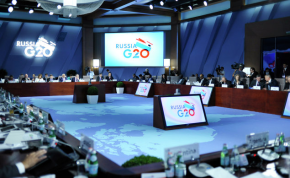 G20 summits are a magnet for expectations. Ever since the grouping was formed in the turbulent early days of the global financial crisis, major stakeholders have pinned many hopes on the ability of the group to steer the globe back to growth.
G20 summits are a magnet for expectations. Ever since the grouping was formed in the turbulent early days of the global financial crisis, major stakeholders have pinned many hopes on the ability of the group to steer the globe back to growth.
The ongoing impact of the crisis has brought into perspective the relationship between issues which previously were tackled in isolation such as growth, energy, tax, reform of global institutions, corruption, employment, investment, trade, infrastructure and financial regulation.
An unexpected consequence of the crisis was the realisation by financial and political elites that many of these issues are interconnected and have an impact on economic growth and overall development. These revelations are not new to many non-governmental stakeholders, and their realisation offers intriguing possibilities for coordinated action, but at the same time has led to a very diverse G20 agenda and high expectations for delivery across these issues.
The expectations for delivery have been heightened by fractious and paralysed multilateral trade negotiations under the World Trade Organisation and the entrenched nature of Great Power positions in the United Nations. This has highlighted the fact that although the last few decades have seen the construction of an interdependent global economy, there is no central authority for its structured management.
The emergence of developing world economic power has not been reflected in related reforms of the few global financial institutions that do exist, such as the International Monetary Fund and World Bank. This lack of reform has therefore reduced their importance and leadership potential, leaving the G20 as the only legitimate forum.
The 2014 summit is the ninth for the G20. The position of chair and host rotates annually. Last year’s chair was Russia, this year it is Australia, and in December 2014 the baton will pass to Turkey. Faced with a broad agenda and a fragile, sluggish global economy, Australia decided to focus on two areas that encapsulate the needs of the global economy – growth and resilience.
In February 2014 G20 Finance Ministers and Central Bank Governors agreed to try to boost GDP across the G20 by at least two percent above current projected levels over the next five years. Fulfilling this expectation could add over U.S. $2 trillion to global GDP and millions of additional jobs.
To make this a reality a ‘Brisbane Action Plan’ will be discussed at the summit and will detail short and medium-term actions to help achieve this growth. This will be a collective commitment; and each country will undertake particular actions to implement this. The G20 members will each in theory have their own comprehensive national growth strategy – expected to contain macroeconomic and structural reforms – when they meet this month. Areas of intervention include: infrastructure investment, reducing trade barriers, promoting competition and boosting employment and economic participation.
The global economy came within inches of another Great Depression when the crisis erupted. The work of the G20 members at that time was crucial in coordinating a response. The lingering effects of the crisis and the apparent fragility of the global system has led to concerted efforts by the G20 to ensure that international and domestic economic policies work together to protect the global economy against future shocks. The repair work is ongoing and business and investor confidence have not fully recovered. A return to global growth and growth that is sustainable requires addressing the causes of the crisis and ensuring financial stability.
To this end, G20 efforts comprise: financial regulation reforms; revamping the international tax system; making global institutions more representative of new voices; improving global energy market operation and resilience; strengthening the global trading system and addressing corruption.
Development has been acknowledged to be an integral component of the G20’s agenda. Two thirds of the world’s poor actually live in G20 countries. A Development Working Group (DWG), was established at the 2010 Seoul Summit, along with a Multi-Year Action Plan on Development. The DWG emphasises the role of economic growth in reducing poverty and opening up opportunities for the poor.
The G20 is trying to complement international efforts towards further progress on internationally agreed development goals and ensure that any future G20 development agenda is flexible enough to respond to the Post-2015 Development Agenda. The most recent summit, in late 2013 in St Petersburg, Russia, produced a Development Outlook as a successor to the Seoul Multi-Year Action Plan.
For South Africa, the 2014 summit agenda is particularly relevant to its development. The country’s leaders and diplomats will seek to influence discussions so as to emphasise domestic and continental positions and realities while playing its part in any coordinated action. The focus on growth is of direct interest given the aim of the National Development Plan to achieve average GDP growth of over five percent, yet estimates for 2014 are two percent.
For Africa, although it has remained the only region where growth has largely continued in spite of persistent sluggish global conditions, policymakers want to ensure any global recovery is inclusive and are concerned whether growth is sustainable.
Experience shows that decades of sustained growth are required to structurally transform economies and lift significant numbers of people out of poverty. Team South Africa will be carrying this message to Brisbane in the hope of supporting outcomes that deliver to this constituency.







